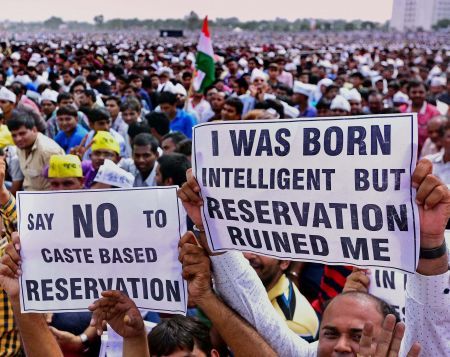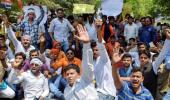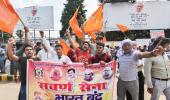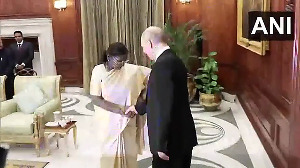'Every person has two identities in India, that of his caste and nation.'
'It is understandable in a multi-caste, multi-religious society and I don't mind this.'
'What I mind is the State has failed in doing enough to melt these two identities in such a way that everybody has access to citizenship which is more important than your caste.'
'That is why people remain in the narrow identities of his caste or religion.'

A key bill to provide Constitutional status to the National Commission for Backward Classes has secured Parliament's approval.
The Bharatiya Janata Party calls it a historic bill while other parties describe it as a political move, passed with the coming assembly election in Chhattisgarh, Madhya Pradesh and Rajasthan.
"Without vote bank, there is no incentive to be in politics. It is a necessary evil," Dr Satendra Kumar, professor at the Gobind Ballabh Pant Social Science Institute, Allahabad University, tells Rediff.com's Shobha Warrier in the final segment of the two-part interview.
- Part 1: 'Reservation is just one aspect'
Do you feel they ignored a very important aspect while creating the National Commission for Backward Castes?
They must have ignored it intentionally as it can create a controversy.
I would say they played a very safe game giving Constitutional status to OBCs which is not going to harm anyone. It empowers some groups, but does not help much.
In Parliament, some MPs felt the creamy layer is the biggest hurdle to the OBC community's upliftment. Do you feel it is time the creamy layer has to be looked into?
Yes, the creamy layer has to be looked into carefully at the political level.
We have to look at the idea behind creating an umbrella for the entire community.
In America, they call it affirmative action while we call it 'reverse discrimination'. Through reverse discrimination, we are helping the communities which are lagging behind.
We are trying to introduce the moral framework like all citizens are equal under the Constitution and it is the moral responsibility of the communities who are forward to help those who lag behind to the forefront.
I feel we should also look at the moral framework of the other communities within the OBC.
You mean the creamy layer?
Exactly. They should look at the creamy layer within the community, also the communities left behind within the OBC.
Similarly, if we believe in the nation-State, the State also has a responsibility to look after and provide reverse discrimination to the communities who were left behind.
But in India, everything culminates in politics. Is that not a tragedy?
In a democracy, you cannot disassociate anything from politics. Every democracy unfolds in a very different way; it all depends on the culture and space.
Caste has become a beacon of democracy in India.
On one side, we are talking about abolishing caste, and on the other, our political process also is strongly linked to caste. Is this the right way forward?
I don't know what is the right way. In fact, all social scientists, liberal politicians and academicians are struggling with this question.
Every person has two identities in India, that of his caste and nation. It is understandable in a multi-caste, multi-religious society and I don't mind this.
What I mind is the State has failed in doing enough to melt these two identities in such a way that everybody has access to citizenship which is more important than your caste.
That is why people remain in the narrow identities of his caste or religion.
It is partly because of the failure of State policies, infrastructure and institutions.
It has failed to provide space for all its citizens and pride in being an Indian citizen.
Do you feel 70 years is too short a period to make people proud of their identity as an Indian citizen?
You can say it is a short period; you can also say it is not a short period.
For a country like China with dictatorship and strong Communist rule, it was easy for them to implement such ideas. But in a democracy, this kind of ideas take its own course.
India is a country with a huge population which is diverse. There is also a problem of lack of resources.
We don't have a straight forward path too because our forefathers and nation-builders have taken the path of democracy. And it has unfolded in a peculiar way with all its strengths and weaknesses.
Yes, the pace of development will be slow in a democracy because of the diverse views on every issue. You can't do it at the pace with which China or Japan have done.
Whether it is Patidars or the Marathas or the Jats, all of them now want to be included in the list of backward communities. Even advanced communities wants the privileges given to the backward communities like reservation.
Political parties associated with each caste want to do it because of vote bank politics.
Where will this lead to?
In this issue, we can see two separate things coming together. We haven't given enough attention or importance to the communities associated with agriculture.
While only 14% of the GDP comes from agriculture, the population depending on agriculture is 60%.
It means substantial income is not coming from agriculture and there is a distress in the sector.
And the communities fighting for reservation are farm communities who have benefitted from the Green Revolution.
The second crucial aspect is liberalisation.
In the '90s, when liberal policies came into the picture, the State withdrew from agriculture -- stopping subsidies etc.
Naturally, their (communities which work in the agriculture sector) income got reduced and there are less and less jobs in agriculture.
They are powerful and influential communities and it is but natural for them to demand (reservations) now.
Do you feel what is needed is the intervention of the State in this sector?
The State should not withdraw from the social sector. Intervention is more needed in education and health.
Simultaneously, the State should promote the private sector too.
What we need is a multi-level policy where the State actively intervenes and strengthens the primary and technical education.
There is a 27% reservation for OBCs, but the government says it can't fill even 11%. Where lies the problem, in the implementation of ideas?
That's why I said the government has to be there actively in education. If you don't have universal education, reservation is not going to happen.
Primary education has totally collapsed in the northern states while it has succeeded in states like Kerala and Tamil Nadu.
I have seen that only the OBCs from the southern states get recruited whenever the government calls for applications. That's because they are the only ones who are educated.
What we need is universal education, not education just for the OBCs, but for everyone.
Is it the failure of the political system?
It is the failure of the political system in the sense that they did not give enough attention to nation-building and institution-building. They brought everything into popular politics.
Vote bank politics?
Without vote bank, there is no incentive to be in politics. It is a necessary evil.
But along with that, you need vision for the country.
Once you get votes and are in power, you have to have a vision, a vision not for only one particular community, but for all communities.
That is because not one community but all communities participate in democracy.
So, we lack politicians with vision?
Yes, lack of vision is the main problem. They are all narrow-minded.
Globalisation also has contributed to the idea of nation-building.
In the 1990s, the idea of global citizens came into the picture and the interest in your own nation-building waned.
Now, after 25 years, you realise that almost all the institutions -- health, education, judiciary -- are collapsing.










